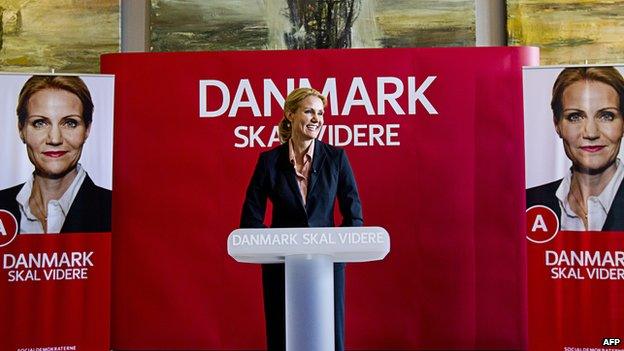EU gripes in Greece and Denmark
- Published

Left-wing and Eurosceptic: Syriza is expected to poll strongly in Greece
Chris Morris: So a week to go, and how are people going to vote?
Here in Athens all the main political parties have stalls and kiosks set up in the city's squares. The faces of candidates - for local and European elections - stare out from billboards as Athenians wander by. But politics has become a bit of a dirty word - the old two-party system, which used patronage to dominate the country for decades, has all but collapsed.
Matthew Price: Most people here in Copenhagen aren't wandering past election posters - they're whizzing by on their bikes in a city that prides itself on its clean, green credentials.
I've been asking Danes what they think of the EU and they seem astonishingly well-informed. Many mention their belief that tackling international problems like climate change is best done at EU level. They also believe membership is good for Denmark's economy. But there's increasing concern at what are perceived as the costs of membership.
Chris Morris and Matthew Price travel across Europe to assess the public mood
CM: Here's the interesting thing about Greece - it is still largely in favour of the EU and membership of the euro.
It has been hit harder than any other country by austerity and the eurozone crisis (the economy has shrunk by a quarter, unemployment is still sky-high and an estimated 40% of families are living in poverty). But that means most people want Europe to do more, not less, to help them. EU regional funding, for example, helps keep many businesses afloat, and will play a vital role in generating future growth.
So: greater support, fewer lectures and enough austerity already. The most common refrain here? "We can't take any more."
MP: Believe it or not, Denmark's sending out a similar message. Though it's driven not out of desperation, but out of a concern that EU-wide rules are eroding traditional Danish values.

Helle Thorning-Schmidt's Social Democrats are in power in Denmark but the People's Party is ahead in polls
The Danes have always had somewhat mixed feelings towards the Union. They almost didn't join back in the early 1970s, and only did so because the UK became a member (Danish trade with the UK was so important that they couldn't risk losing Britain as an economic partner once it joined the single market).
The state of the polls in Greece and Denmark
There's a huge political row here over the EU requirement that Denmark must give EU immigrants the same child benefits that Danes expect. The same issues that dominate in many other northern EU countries are now widely discussed here. Immigration, welfare "tourism", cross-border crime. In all, many see the EU as the culprit.
CM: When it comes to immigration, the concern in Greece is that other EU countries aren't doing enough to help it deal with the flood of illegal immigrants arriving here by land and sea. It adds to that feeling of a lack of solidarity for southern Europe from an aloof north. It also helps fuel support for Golden Dawn, seen by many here as a neo-Nazi party.
And there is one of Europe's conundrums: Greece will be sending a pretty eclectic bunch of MEPs to the European Parliament, including representatives of both the hard left and the extreme right.
There's also a new pro-EU centre party, formed only a few weeks ago, that might end up in third place overall. A country that remains broadly pro-European, despite the hardship it has suffered in the last few years, looks set to cast a big protest vote against politics as usual.